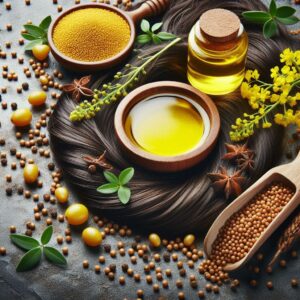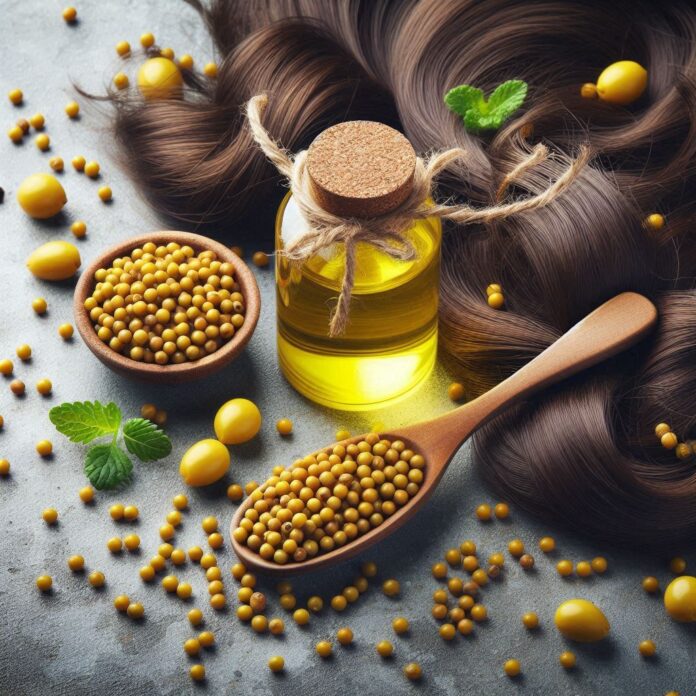Mustard seed oil, an ancient remedy long cherished in various cultures for its medicinal properties, has recently gained attention for its potent benefits in hair care. Rich in essential nutrients such as fatty acids, vitamins, and minerals, this natural elixir promises to transform the way we approach hair health and growth. This article delves into the science behind mustard seed oil, exploring how its unique components contribute not only to nourishing the scalp and hair but also to stimulating robust hair growth.
I. Nutrient-Rich Composition of Mustard Seed Oil for Hair Growth:

Mustard seed oil is renowned for its diverse and rich nutrient composition, which plays a crucial role in stimulating hair growth. This section explores the specific nutrients found in mustard seed oil and how they contribute to healthy hair.
1. Omega-3 and Omega-6 Fatty Acids:
Omega-3 and Omega-6 fatty acids are essential polyunsaturated fats that are vital for maintaining the health of hair follicles. These fatty acids help reduce scalp inflammation, which can hinder hair growth. By reducing inflammation, these nutrients promote a healthier scalp environment conducive to hair growth. Furthermore, they enhance blood circulation in the scalp, ensuring that hair follicles receive an adequate supply of oxygen and nutrients necessary for growth.
2. Vitamin E:
Vitamin E is a powerful antioxidant found in mustard seed oil. This vitamin helps protect hair cells from damage caused by free radicals, which can weaken the hair shaft and lead to hair loss. Vitamin E also promotes capillary growth in the scalp, improving blood flow and thus enhancing the delivery of nutrients to the hair follicles. This improved blood flow supports stronger and healthier hair growth.
3. Proteins and Minerals:
Mustard seed oil contains a variety of proteins and minerals, including calcium, magnesium, and zinc, which are essential for hair health. Proteins are fundamental building blocks of hair, aiding in the repair and strengthening of hair shafts. Minerals such as zinc play a crucial role in maintaining the health of hair follicles by supporting cellular reproduction and tissue growth. These nutrients work together to fortify the hair structure and prevent hair breakage and loss.
4. Glucosinolates and Allyl Isothiocyanate:
Glucosinolates and allyl isothiocyanate are compounds found in mustard seed oil that give it its distinctive pungent smell and warming properties. When applied to the scalp, these compounds stimulate blood circulation, enhancing the flow of nutrients and oxygen to hair follicles. This increased circulation not only promotes hair growth but also improves the overall health of the scalp, reducing the risk of conditions such as dandruff and dryness.
5. Essential Fatty Acids:
Mustard seed oil is rich in essential fatty acids like linoleic acid and oleic acid. These fatty acids are crucial for maintaining the lipid barrier of the scalp, which helps retain moisture and keep the scalp hydrated. A well-hydrated scalp is less prone to dryness and flakiness, conditions that can impede hair growth. Additionally, these fatty acids nourish the hair shafts, making them stronger and more resilient to damage.
6. The Power of Nutrients in Mustard Seed Oil for Hair Growth:
The nutrient-rich composition of mustard seed oil makes it a potent natural remedy for promoting hair growth. By incorporating essential fatty acids, vitamins, proteins, and minerals, mustard seed oil nourishes and strengthens hair from the roots to the tips. Regular use of this oil can lead to healthier, stronger, and more vibrant hair. For best results, it is recommended to use mustard seed oil in combination with other beneficial oils and to follow proper application methods to maximize its benefits.
II. How Mustard Seed Oil Stimulates Hair Growth?

Mustard seed oil is renowned for its ability to promote hair growth, and this effect is primarily due to several key mechanisms driven by its unique components. Here’s a detailed exploration of how mustard seed oil stimulates hair growth:
1. Enhanced Blood Circulation:
One of the primary ways mustard seed oil promotes hair growth is by improving blood circulation in the scalp. The oil contains compounds like allyl isothiocyanate, which create a warming sensation upon application. This warmth helps dilate blood vessels, increasing blood flow to the hair follicles. Enhanced blood circulation ensures that hair follicles receive an ample supply of oxygen and essential nutrients, which are crucial for promoting hair growth and maintaining healthy hair.
2. Deep Nourishment of Hair Follicles:
Mustard seed oil is rich in essential nutrients such as omega-3 and omega-6 fatty acids, vitamins, and minerals. These nutrients penetrate deeply into the scalp and hair follicles, providing the necessary nourishment to support hair growth. Fatty acids help maintain the lipid barrier of the scalp, ensuring it remains hydrated and healthy. Vitamins, especially Vitamin E, act as antioxidants protecting the hair from damage caused by free radicals.
3. Strengthening Hair Shaft and Roots:
The proteins and minerals found in mustard seed oil, such as calcium, magnesium, and zinc, are essential for strengthening the hair shaft and roots. These components help repair and fortify the hair structure, making it less prone to breakage and shedding. Stronger hair roots mean a reduced rate of hair loss and improved hair density.
4. Anti-inflammatory Properties:
Mustard seed oil has anti-inflammatory properties that help reduce scalp inflammation. Inflammation can damage hair follicles and hinder hair growth. By reducing inflammation, mustard seed oil creates a healthier environment for hair growth. This is particularly beneficial for individuals with scalp conditions like dandruff or eczema. The anti-inflammatory effects are primarily due to the presence of allyl isothiocyanate and alpha-linolenic acid (ALA), which help soothe and calm irritated scalp skin
5. Anti-microbial and Antifungal Effects:
The antimicrobial and antifungal properties of mustard seed oil helps maintain a healthy scalp by preventing infections that can lead to hair loss. Conditions such as dandruff and fungal infections can block hair follicles and inhibit hair growth. Using mustard seed oil can help combat these issues, ensuring a clean and healthy scalp conducive to hair growth. These properties are attributed to the presence of allyl isothiocyanate and phenolic compounds, which possess strong antimicrobial activities
6. Stimulation through Massage:
When used for scalp massages, mustard seed oil can further enhance its benefits. Massaging the scalp with mustard seed oil not only helps in improving blood circulation but also ensures better absorption of the oil’s nutrients into the hair follicles. Regular scalp massages with mustard seed oil can significantly boost hair growth over time.
7. The Power of Nutrients in Mustard Seed Oil for Hair Growth:
Mustard seed oil stimulates hair growth through a combination of enhanced blood circulation, deep nourishment of hair follicles, strengthening of the hair shaft, and maintaining a healthy scalp environment. Its rich nutrient profile and beneficial properties make it a potent natural remedy for those looking to improve their hair health and promote growth. Regular use of mustard seed oil, combined with proper application methods, can lead to healthier, stronger, and more vibrant hair.
III. Application Methods for Maximum Benefits:

To maximize the hair growth benefits of mustard seed oil, proper application is key. Here are some effective methods to ensure you reap the full advantages of this potent oil:
1. Scalp Massage:
-Method:
Warm a small amount of mustard seed oil and gently massage it into your scalp using your fingertips. Use circular motions to enhance blood circulation and ensure the oil penetrates deeply into the hair follicles.
-Benefits:
Regular scalp massages with mustard seed oil can significantly improve blood circulation, delivering essential nutrients and oxygen to the hair follicles, thereby promoting hair growth.
2. Hair Mask:
-Ingredients:
•1 tablespoon mustard seed oil
•1 tablespoon coconut oil
•1 tablespoon castor oil
-Method:
Mix the oils and apply the mixture evenly to your scalp and hair. Cover your head with a shower cap and leave the mask on for 30 minutes to an hour. Wash it off with a mild shampoo.
-Benefits:
This mask provides deep nourishment and hydration, strengthening the hair shaft and reducing hair breakage.
3. Overnight Treatment:
-Method:
For an intensive treatment, apply mustard seed oil to your scalp and hair before bed. Cover your hair with a silk scarf or a shower cap to protect your bedding. Wash out the oil thoroughly the next morning with a mild shampoo.
-Benefits:
Leaving the oil on overnight allows it to penetrate deeply, providing prolonged hydration and nourishment to the hair and scalp.
4. Dilution with Other Oils:
-Ingredients:
•Mustard seed oil
•Carrier oils (e.g., coconut oil, olive oil, or almond oil)
-Method:
Due to its potent nature, mustard seed oil should be diluted with a carrier oil to avoid skin irritation. Mix one part mustard seed oil with two parts carrier oil before applying it to your scalp and hair.
-Benefits:
Dilution ensures safe application while still delivering the beneficial properties of mustard seed oil. The combination with other nourishing oils can enhance the overall effectiveness of the treatment.
5. Hot Oil Treatment:
-Method:
Warm mustard seed oil and apply it to your scalp and hair. Cover your head with a warm towel to create a steaming effect, which helps the oil penetrate deeper into the hair follicles. Leave it on for 20-30 minutes, then wash it off with a mild shampoo.
-Benefits:
Hot oil treatments help open up the hair cuticles and pores, allowing for better absorption of the oil’s nutrients. This method is particularly beneficial for dry and damaged hair.
6. The Power of Nutrients in Mustard Seed Oil for Hair Growth:
Mustard seed oil stimulates hair growth through a combination of enhanced blood circulation, deep nourishment of hair follicles, strengthening of the hair shaft, and maintaining a healthy scalp environment. Its rich nutrient profile and beneficial properties make it a potent natural remedy for those looking to improve their hair health and promote growth. Regular use of mustard seed oil, combined with proper application methods, can lead to healthier, stronger, and more vibrant hair.
IV. Precautions and Tips:

While mustard seed oil is beneficial for hair growth, it is essential to use it correctly to avoid potential side effects. Here are some detailed precautions and tips to ensure safe and effective use:
1. Dilution:
-Importance of Dilution:
Mustard seed oil is potent and can cause skin irritation or a burning sensation if used undiluted. To prevent this, it should always be mixed with a carrier oil before application.
-Recommended Carrier Oils:
Common carrier oils that can be used to dilute mustard seed oil include coconut oil, olive oil, almond oil, and jojoba oil. These oils not only help in reducing the intensity of mustard seed oil but also add their beneficial properties to the treatment.
-Dilution Ratio:
A typical dilution ratio is one part mustard seed oil to two parts carrier oil. This ensures that the mustard seed oil remains effective without irritating.
2. Patch Test:
-Why Conduct a Patch Test?:
A patch test helps determine if you have an allergic reaction to mustard seed oil. Given the strong nature of this oil, it is crucial to test for any adverse reactions before applying it extensively to your scalp and hair.
-How to Conduct a Patch Test?
•Apply a small amount of diluted mustard seed oil (mix it with carrier oil) on the inner part of your elbow or behind your ear.
•Leave it on for 24 hours without washing it off.
•Observe the area for any signs of redness, itching, or irritation.
-Interpreting Results:
If no reaction occurs within 24 hours, it is generally safe to use the oil on your scalp. If you experience any irritation, discontinue use immediately and rinse the area with water.
3. Avoid Overuse:
-Frequency of Use:
Mustard seed oil should be used in moderation to avoid overloading the scalp and hair with its strong components. Overuse can lead to scalp irritation and other adverse effects.
-Recommended Usage:
It is advisable to use mustard seed oil 1-2 times a week. This frequency allows the scalp to benefit from the oil’s properties without causing excessive irritation or buildup.
-Signs of Overuse:
Watch for symptoms such as redness, itching, or a burning sensation on the scalp. If these occur, reduce the frequency of use or further dilute the oil with a carrier oil.
4. Additional Tips:
-Storage:
Store mustard seed oil in a cool, dark place to prevent it from becoming rancid. Ensure the bottle is tightly closed to maintain its potency.
-Combination with Other Treatments:
Mustard seed oil can be combined with other natural treatments like aloe vera or honey for added benefits. These combinations can provide additional hydration and soothing effects.
-Consultation:
If you have sensitive skin, or scalp conditions, or are pregnant, consult a healthcare provider before using mustard seed oil to ensure it is safe for you.
5. The Power of Nutrients in Mustard Seed Oil for Hair Growth:
Mustard seed oil stimulates hair growth through a combination of enhanced blood circulation, deep nourishment of hair follicles, strengthening of the hair shaft, and maintaining a healthy scalp environment. Its rich nutrient profile and beneficial properties make it a potent natural remedy for those looking to improve their hair health and promote growth. Regular use of mustard seed oil, combined with proper application methods, can lead to healthier, stronger, and more vibrant hair.
Conclusion:
The exploration of mustard seed oil as a natural remedy for hair growth reveals its significant potential to enhance hair health through a variety of mechanisms. From improving blood circulation and reducing inflammation to nourishing hair follicles and preventing microbial infections, mustard seed oil offers a holistic approach to maintaining a healthy scalp and lustrous hair. Embracing this natural oil as part of a regular hair care regimen can lead to stronger, healthier, and more vibrant hair, proving that traditional remedies often hold timeless value in modern wellness practices.

